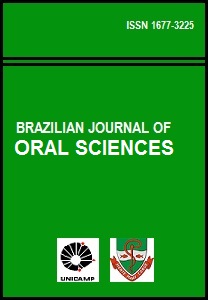Abstract
Many problems in the oral cavity that are common in childhood can be prevented with pediatrician guidance. Due to the strict relationship between the pediatrician and child parents, the objective of this study was to evaluate pediatrician knowledge about promoting oral health, correlating this information with the professional profile. For this, issues about fluoride application, oral habits and their consequences, diet and its relation with oral health, teething development, caries control, oral hygiene and forwarding to dentist were covered. Fiftyone pediatricians that do clinical care in two different cities of São Paulo State were evaluated. In 78.3% of the cases, a regular (10 or 11 correct answers) to appropriate (12 or more correct answers) knowledge level on oral health was verified. Although the results are positive, most pediatricians do not have some important information such as breast milk cariogenicity, when teeth formation starts and the appropriate age to remove a non-nutritive sucking habit. Based on the resulting data, we conclude that pediatricians’ knowledge about oral health can and must be improved, provided that there is more integration with dentistry area, especially when doctors are still in Graduation or Post-graduation.References
Camargo MCF. Programa preventivo e interceptativo de maloclusões na primeira infância. In: Corrêa MSN. Odontopediatria na primeira infância. São Paulo: Santos; 1998. cap. 13, p.139-63.
Paiva MS, Bezerra VLVA, Toledo OA. O pediatra e a saúde bucal da criança. RGO. 1990; 38: 96-100.
Griffen AL, Goepferd SJ. Preventive oral health care for the infant, child and adolescent. Ped Clin North Am. 1991; 38: 1209-26.
Tsamtsouris A, Gravis V. Survey of pediatrician’s attitudes towards pediatric dental health. J Clin Ped Dent. 1990; 14: 152-64.
Schulte JR. Early childhood tooth decay_ pediatric interventions. Clin Pediatr. 1992; 31: 727-30.
Johnsen DC. The role of pediatrician in identifying and treating dental caries. Ped Clin North Am. 1991, 38: 1173-81.
Walter LRF, Ferelle A, Hokama N, Pelanda VLG, Franco MPS, Iega R. Cárie em crianças de 0 a 30 meses de idade e sua relação com hábitos alimentares. Encicl Bras Odontol. 1987; 5: 129-36.
Toledo OA. Odontopediatria - fundamentos para a prática clínica. São Paulo: Panamericana; 1988.
Pierotti SR. Amamentar: influência na oclusão, funções e hábitos orais. Rev Dent Press Ortod Ortop Facial. 2001; 6: 91-8.
Pipes PL. Nutrition in infancy and childhood. Prim Care. 1982; 9: 497-516.
Blinkhorn A. Diet, dental caries and health education. Dent Health 1985; 24: 3-4.
Fanning EA. Nutrition in childhood: the hole of the dentist. Aust Dent J. 1979; 24: 352-7.
Ramalingam L, Messer LB. Early Childhood caries: an update. Singapore Dent J. 2004; 26: 21-9.
Seow WK. Biological mechanisms of early childhood caries. Community Dent Oral Epidemiol. 1998; 26(Suppl 1): 8-27.
Erickson PR, McClintock KL, Green N, LaFelur J. Estimation of the caries-related risk associated with infant formulas. Pediatr Dent. 1998; 20: 395-403.
Peres RC, Coppi LC, Franco EM, Volpato MC, Groppo FC, Rosalen PL. Cariogenicity of different types of milk: an experimental study using animal model. Braz Dent J. 2002; 13: 27-32.
Miller RE, Rosenstein DJ. Saúde dentária da criança: supervisão pelo médico. In: Clinicas pediatricas de norteamerica. São Paulo: Interamericana; 1982. p.471-80.
Re G, Fogliano F, Franco R, Mulic P, Riccomagno G, Cerutti F, et al. Role of the pediatrician in preventing caries. A statistical survey of a sample of 250 Piedmontese doctors. MinervaStomatol 1986; 35: 281-3.
The Brazilian Journal of Oral Sciences uses the Creative Commons license (CC), thus preserving the integrity of the articles in an open access environment.

